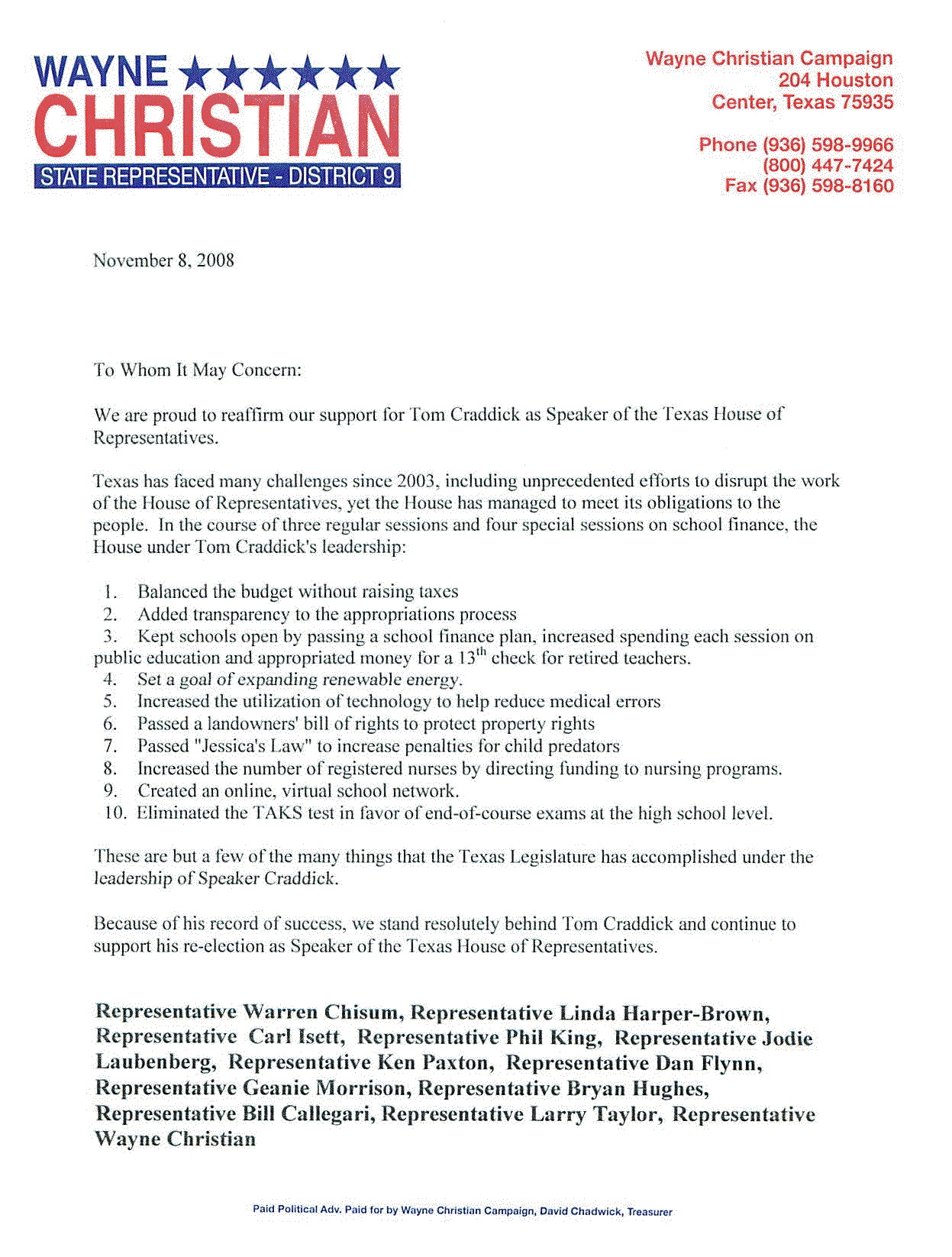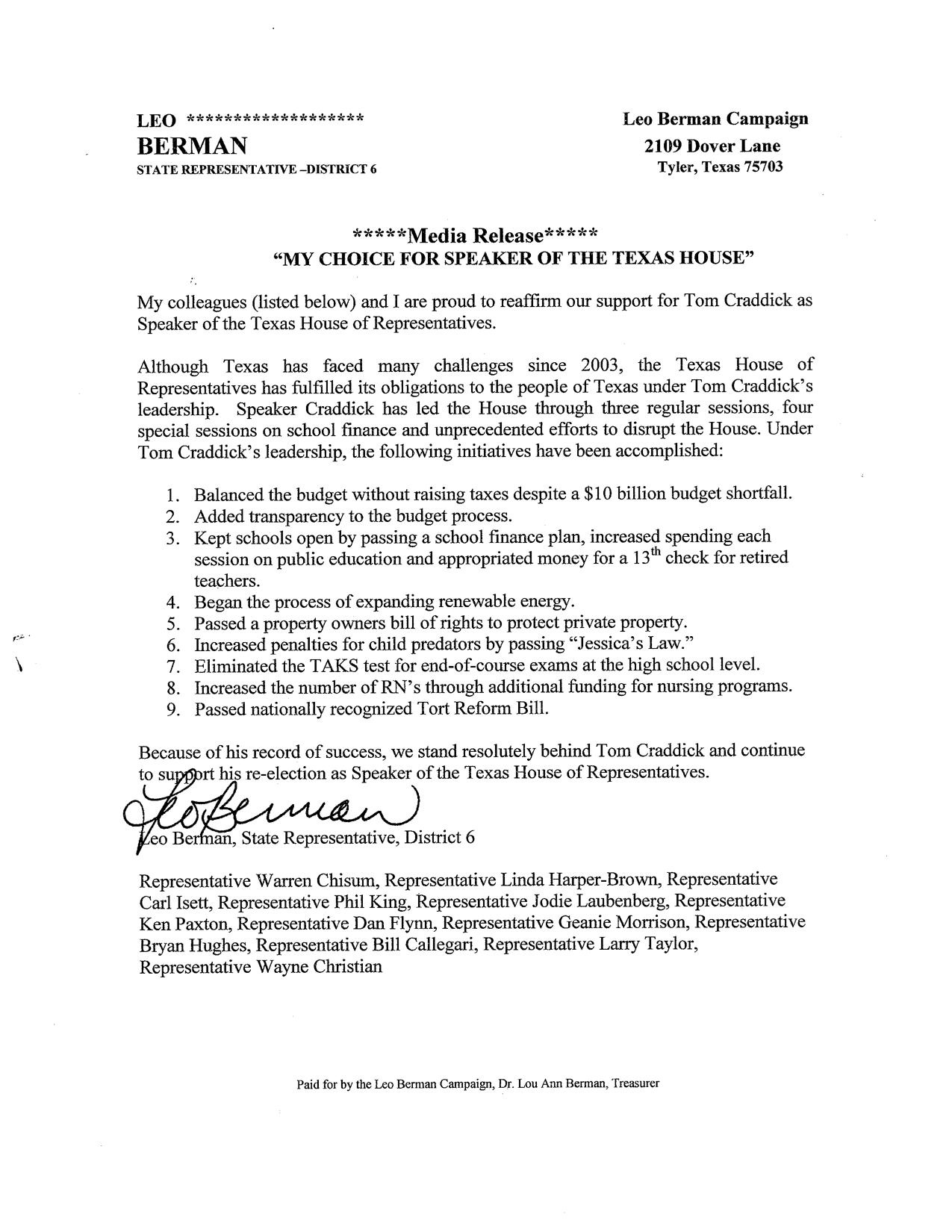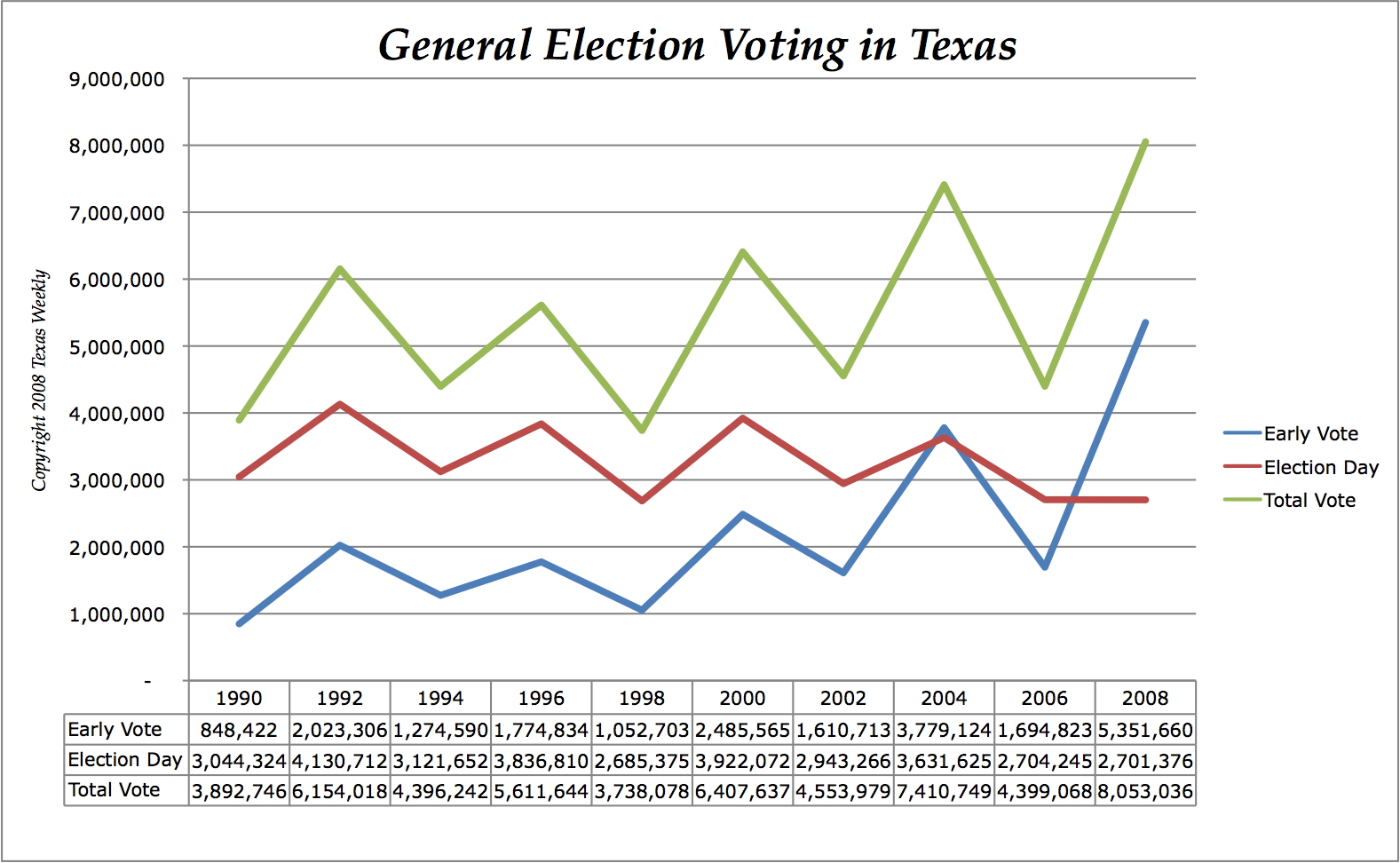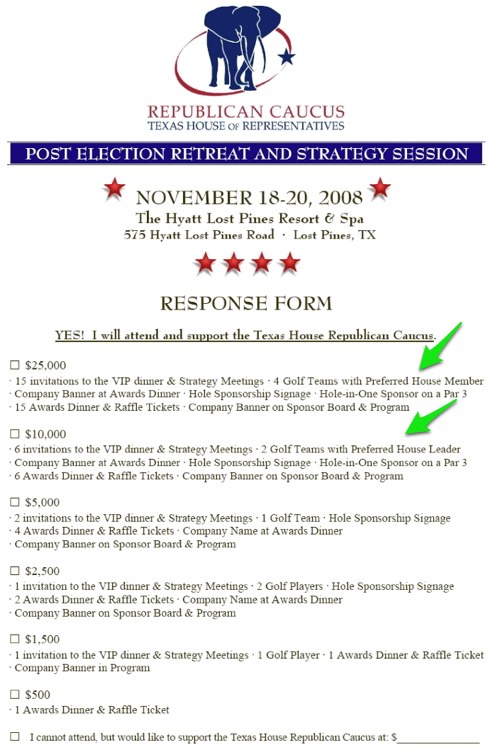A lobbyist who doesn't want his name in this newsletter or anywhere else offered up a new phrase for this phase of the race for speaker: Legislative Osteoporosis. He's referring to bone loss in the spines of some lawmakers.
Have a little sympathy. They're stuck between Speaker Tom Craddick and a sea of contenders for his job. Everybody's claiming momentum, but only one list has been made public and it's only got 13 names on it.
The Democrats claim 64 signatures on the Not Craddick pledge we wrote about last week. That's a lot, if they're all there and all telling the truth, but it's not the 76 required to knock the guy off.
You can add eight to ten Republicans to that if you include those who say they want to be speaker and those who say, directly or not, that they're looking for a change.
That's not 76, either, but it's close enough to give you goose bumps.
The short list is from a letter of support for Craddick from 13 Republicans. That's the 98-pounder on this beach and it caused some nervous giggles in the House and in the lobby world, but at least they're showing their names. That's unusual at this point.
They got some clarity out of Linda Harper-Brown's apparent win in HD-105. If that holds, the Republicans are in the majority. A Democratic speaker would be unlikely, so you can halve the number of candidates for now (a recount is likely).
That helped a bit. But in fact, there's been almost no public movement in days, as members tentatively feel their way though this.
They don't like it. Nobody wants to land on the losing side, whether they like Craddick or not, and that might be the incumbent's strongest selling point at the moment.
Delay works against him, one argument goes, because this institutional hesitation underscores his weak position and gives his foes time to forge deals and work on wavering lawmakers. The other side of that: Craddick's done this before. He's good at it, and the fact that the other side hasn't closed the deal is giving him time to talk to enough people to win him a fourth term.
Go back to those numbers, though: House Democratic leader Jim Dunnam of Waco sent a memo to his colleagues saying they've got 64. They're not naming names, but that'd be a helluva bluff.
The next play might come in Bastrop County, where the Republicans hold their first post-election gathering next week at the Hyatt Lost Pines Resort. They'll get a head-count, or might get one, and Craddick will have a solid idea of whether he can survive in a chamber with 76 Republicans and 74 Democrats.
It's probably not that important at this point to get 76 signatures on the Democrat's petition. They've framed the issue — keep him or quit him — and managed to make the scramble to replace him a secondary issue. That sort of scramble, you'll recall, helped undo the challengers to Craddick two years ago.
We're sticking with that headline for another week.
The current list of challengers on the GOP side includes Byron Cook of Corsicana, Dan Gattis of Georgetown, Delwin Jones of Lubbock, Jim Keffer of Eastland, Edmund Kuempel of Seguin, Tommy Merritt of Longview, Jim Pitts of Waxahachie, and Burt Solomons of Carrollton.
Counting, Counting... Counted
Rep. Linda Harper-Brown, R-Irving, won another term in the Legislature, and the Republicans hold the narrowest possible majority, with 76 House members to the Democrats' 74.
Dallas County went through the military ballots that hadn't been counted in HD-105, adding five votes to her total. Provisional ballots were lopsided in favor of her opponent, but not enough so to flip the results. She ended up with a 20-vote lead (out of 40,753 cast) over Democrat Bob Romano, who's also from Irving.
The panel inspecting the votes in that race had 231 provisional ballots to look at — ballots that had been set aside because of questions about the eligibility of the voters. Romano won 36 votes there, to Harper-Brown's 24. That wasn't enough to do the trick. He won in early voting. She won on Election Day. And with everything counted, she's the winner by a nose. James Baird, the Libertarian in that race, got 1,061 votes, keeping both of the major party candidates from crossing the 50 percent mark.
Romano's likely to seek a recount. You would probably do the same thing: Some of these are paper, or optical, ballots (the kind where you're supposed to fill in the circle with a No. 2 pencil), and there were more than 40,000 votes cast.
Harper-Brown has been in the House for three terms; she's part of the big 2002 class that gave the Republican Party its first Texas House majority since Reconstruction. And she's a backer of House Speaker Tom Craddick, who is being challenged for that position and who, like his rivals, hasn't yet amassed the votes he needs to win another term.
Support for Craddick
That skimpy letter we mentioned? It's actually two letters.
Under Rep. Wayne Christian's letterhead, the lawmakers list legislative accomplishments during Craddick's six-year tenure and say those things were done in spite of obstacles "including unprecedented efforts to disrupt the work of the House of Representatives" by parties not named in the letter. A second letter, over Leo Berman's signature, adds him to the mix. The lawmakers named (no signatures on the copy we got) are Warren Chisum of Pampa, Linda Harper-Brown of Irving, Carl Isett of Lubbock, Phil King of Weatherford, Jodie Laubenberg of Parker, Ken Paxton of McKinney, Dan Flynn of Van, Geannie Morrison of Victoria, Bryan Hughes of Mineola, Bill Callegari of Katy, Larry Taylor of Friendswood, and Christian.
What's So Special About Tuesdays?
A peculiar statistic from the unofficial returns on this year's general election: Election Day voting was virtually the same in the presidential election this year as in the gubernatorial election two years ago.
This year, 2,701,376 people turned out on E-Day, about 33.5 percent of those who voted. Two years ago, 2,704,245 showed up on Election Day, about 61.5 percent of those who voted.
Total voting was higher this year, even though the Election Day numbers were flat: 8,053,036 voted in this year's election, while 4,399,068 voted two years ago.
Another note while you're looking at this chart: The raw number of voters is steadily increasing (goober years are lower than prexy years, but the trend line is up). But the turnout — as a percentage of what the Census folk call "Voting Age Population" — is slipping, or flat. In gubernatorial years starting five elections ago, the numbers were: 1990, 31.1 percent; 1994, 33.6 percent; 1998, 26.5 percent; 2002, 29.4 percent; and 2006, 26.4 percent. In presidential years, the series goes like so: 1992, 47.6 percent; 1996, 41 percent; 2000, 44.3 percent; 2004, 46.1 percent; and 2008, 45.4 percent.
This was the second presidential election in a row where early voting exceeded Election Day voting. But in 2004, when early voting accounted for 51 percent of the total, it was fairly close. This time, the early vote accounted for two of every three votes — 66.5 percent. The state hasn't done that in a gubernatorial election year. The highest in recent history was in 2000, when 38.8 percent of the voters went early.
Only 88 of the state's 254 counties had early turnouts of less than 50 percent of the total vote. In Dickens County, only 17 people voted early, out of 972 voters. That's an early turnout of 1.7 percent.
In Wichita County, 80.6 percent of the votes were in the box before Election Day. Early voting accounted for more than 70 percent of the total in some of the state's biggest counties, including Bexar, Brazoria, Collin, Denton, Fort Bend, Lubbock, Tarrant, Travis, and Williamson.
Mapping the Vote
Obama won only 28 of Texas' 254 counties, but they included some of the big ones. McCain won by nearly one million votes (946,854, to be unofficially exact). He did it by beating the Democrat in 226 counties, racking up an advantage of 1.4 million votes. Obama offset that with the 464,551 margin he amassed in 28 counties. 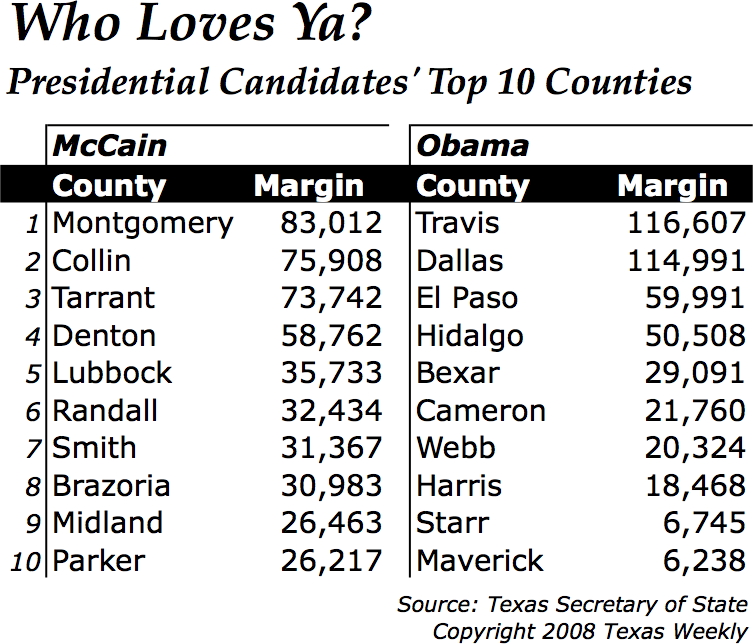 What's interesting, though, is what counties fell where. McCain did best in suburban and large rural counties (Tarrant County being the big exception). Obama did best in urban counties and in South Texas.
What's interesting, though, is what counties fell where. McCain did best in suburban and large rural counties (Tarrant County being the big exception). Obama did best in urban counties and in South Texas.
Third-party candidates were a non-starter in the presidential race, getting only 64,124 of the 8.1 million votes cast.
Remember when everyone was looking at the numbers from the top 15 counties and talking about a Democratic turnout? They weren't that far off, but those counties weren't representative of the state. If only the top 15 counties had counted, Obama would have won in Texas. Those counties, taken together, voted blue; the margins there were obliterated by the rest of the state's voters. That was even more pronounced in the 10 largest counties. And the keys to the Democrat's victories there were Travis and Dallas counties, each of which gave Obama margins of more than 110,000 votes.
A few big counties didn't tip hard to one candidate or the other. In Harris County, the spread only accounted for 1.6 percent of the vote. It went to Obama, who picked up almost 19,000 votes over McCain, but that big number is, in that county, little more than a rounding error. Fort Bend County surprised a lot of watchers by almost landing at center court: Only 4,710 votes out of 102,846 separated the two candidates. Take that county out of the reliably Republican column. The difference in Bexar County was only 5.5 percent; Obama got the 29,091-vote difference, but it wasn't a landslide.
The smallest margin, in raw votes, was in Kenedy County, where Obama finished 15 votes ahead of McCain. Next in line was Hudspeth County, where McCain won by 28 votes.
Tube Tops
You'll be sitting there in the Texas House in a few months, all set for the slow drone of another legislative day, when two dozen TV cameras come out of nowhere.
We call them TV bills, and the first legislative filings have plenty of potential (this was the first week bills could be filed for the 2009 session). This stuff is sometimes serious, sometimes goofy. It grabs headlines. It sucks the air out of everything else, eats time and attention and gets more press than some of the big things, like the budget and big industry regulation. Remember the cheerleader booty bill a couple of sessions ago seeking to regulate overtly sexual dancing at high school football games? The HPV vaccine? School vouchers? TV City.
Sample bill captions — the titles on the legislation — from the early offerings for the next legislative session:
• Relating to providing Internet access in certain local public libraries.
• Relating to the determination of the appraised value of a residence homestead for ad valorem taxation.
• Relating to an offense of using a wireless communication device while operating a motor vehicle in a school crossing zone.
• Relating to prohibitions on the use of a wireless communication device while operating a motor vehicle.
• Relating to repeal of authority for the establishment and operation of the Trans-Texas Corridor.
• Relating to disclosing information to persons obtaining emergency contraception.
• Relating to the procedures for registering to vote and accepting a voter at a polling place.
• Relating to requiring a voter to present proof of identification.
• Relating to limits on political contributions and expenditures in connection with certain legislative and executive offices.
• Relating to the use of direct recording electronic voting machines.
• Relating to the limitation on increases in the appraised value of a residence homestead for ad valorem taxation.
• Relating to the election of the commissioner of insurance.
• Relating to eliminating automatic admission to certain public institutions of higher education based on high school grade point average.
• Relating to regulation of property and casualty insurance rates.
• Relating to a limitation on the amount of tuition charged by public institutions of higher education.
Mayor Strayhorn?
Maybe you remember laughing about thiscockamamie idea, or maybe thisscheme. But Carole Keeton Strayhorn wasn't kidding — she is running for mayor.
Strayhorn met Wednesday evening near the Capitol with around 200 potential supporters, asked them all to write down four things they'd like the next mayor to do. She told the group that she'll be raising money — Louise Epstein will be her treasurer — and a full-blown announcement of her candidacy will come after the holidays.
The theme is "Carole for Mayor."
One attendee told us that she didn't use the word grandma at all; she's campaigned for the last few years as "One Tough Grandma." Among the attendees: Former Austin Mayor Lee Cooke, former UT Chancellor Bill Cunningham.
Strayhorn was already mayor of Austin once — after she'd been on the Austin school board and before she was a state insurance commissioner, railroad commissioner, and comptroller. She's lost three elections, including a run for Congress against former U.S. Rep. J.J. "Jake" Pickle, her initial bid for railroad commission, and her bid, as an independent in 2006, for governor against Rick Perry, Chris Bell and Kinky Friedman.
Flotsam & Jetsam
It seems like ancient history in some ways, but the scrap over the Texas Two-Step — the caucus/popular vote process for choosing presidential candidates in the Democratic primaries — is coming to a head.
The Democrats came out of the primaries, and then out of their convention in Austin a few months later, with a promise to reexamine their oddball system. Sen. Royce West of Dallas headed a panel that's been around the state hearing from Democrats. Now they're ready to talk about changes. Party officials have said they want to tweak the system without killing it; others want to nix the caucus half of the deal and are loud about it, operating under the banner of Change the Caucus.
Refresher course: Democrats in Texas vote in primaries, then go to caucus meetings to choose delegates for their candidates. Barack Obama lost to Hillary Clinton in the voting, then beat her in the caucuses. They split the delegates and the whole confusing thing managed to irk Democrats on both sides. They meet Friday of this week for the last time. Recommendations will follow.
• The Secretary of State will canvass general election votes as early as next week (11/19). Candidates who want recounts have until two days after that's done to make their requests; after that, they have to live with what they got.
• Brian Walker of Tatum hasn't yet decided whether to ask for a recount. He also lost to an incumbent, but to a Democrat — Chuck Hopson of Jacksonville. The spread in that race was 102 votes and the four counties are split in their voting systems: In two, it's paper ballots; in two others, voters can choose between voting on a paper ballot or on an electronic ballot.
• Lt. Gov. David Dewhurst hosted a fundraiser for Republican Joan Huffman this week. Coming up: A funder for Democrat Chris Bell at Sen. Kirk Watson's house in Austin. Huffman and Bell face off in a special election runoff for the SD-17 Senate seat next month. Gov. Rick Perry hasn't yet set the date for that. The canvass in that election is set for Tuesday and Perry has to pick a date between 20 and 45 days after that canvass. That would put it somewhere after the first week in December.
• Several commercial real estate trade groups have formed a super-group — the Real Estate Development Association of Texas — to handle legislative worries for all of them. The joiners include the Real Estate Council of Austin, the Real Estate Council (Dallas), Greater Fort Worth Real Estate Council, the Houston Real Estate Council, Houstonians for Responsible Growth, and the Real Estate Council of San Antonio.
Political People and Their Moves
Andrew Weber is the new First Assistant to Attorney General Greg Abbott, replacing Kent Sullivan, who got a new gig (see below). Weber was the Clerk to the Texas Supreme Court and an attorney in private practice before signing on as Deputy AG for Legal Counsel about a year ago. Jonathan Frels, now chief of the public finance division in the AG's office, will move into the job Weber is leaving.
Comal County Tax Assessor-Collector Sherman Krause joins Comptroller Susan Combs' office as head of a revamped Property Tax Assistance Division. That's the division that, among other things, oversees county appraisal district valuations of property for taxes; Combs also is moving appeals of rulings from the comptroller's office to the State Office of Administrative Hearings, so appraisal districts can go to another agency when they disagree with the comptroller's work.
Charles Cooper is the state's new banking commissioner. The former federal bank examiner and bank executive started this week. Randall James retired from that job earlier this year.
Jim Harrison will be the new head of intergovernmental relations for the Texas Commission on Environmental Quality. He's currently in the governor's office of homeland security.
Glenn Shankle, the recently retired executive director of the Texas Commission on Environmental Quality, is hanging out a lobby shingle. He and a couple of former TCEQ colleagues — Sonia Ralls and Kerri Rowland — will concentrate on environmental issues at the legislative and agency level.
M. Scott Norman gets rid of the word interim, becoming executive director of the Texas Association of Builders. He's been at that trade group since 2003, when he left a staff spot in the Texas Senate.
Daniel Donohoe moved to Comerica as director of government relations from JPMorgan Chase. He'll remain based in Dallas.
Gov. Rick Perry followed the election with a bunch of postings, including several judicial appointments that will stand until the next general elections (and didn't have to weather this year's political storms):
• Kent Sullivan, the state's first assistant attorney general, to the 14th Court of Appeals in Houston. He's a former state district judge, and replaces Wanda Fowler.
• Sylvia Matthews, a Houston attorney with Andrews and Kurth, to the 281st District Court, replacing David Bernal.
• Don Hinde, an attorney with Steele Sturm in Houston, to the 269th District Court, replacing John Wooldridge.
• David Peeples of San Antonio as presiding judge of the Fourth Administrative Judicial Region; that's a reappointment.
• Stephen Ables of Kerrville as presiding judge of the Sixth Administrative Judicial Region; he presides in the 216 District Court, and is being reappointed to the admin job.
• Kelly Moore of Brownfield as presiding judge of the Ninth Administrative Judicial Region; that's a reappointment, and Moore is the judge in the 121st District Court.
The non-judicial wheel was turning, too. Perry appointed:
• David Baucom of Sulphur Springs to the Texas Medical Board. He's president of an insurance agency.
• Jose Cuevas Jr., founder and president of JumBurrito in Midland, to the chairmanship of the Texas Alcoholic Beverage Commission, and Melinda Fredricks of Conroe to a spot on that same board. She's a former teacher and community volunteer.
• Mike Allen, Claudell Kercheville, and Scott Parker to the Upper Guadalupe River Authority Board. All three are from Kerrville. Allen is chairman of Union State Bank. Kercheville is retired from Frost Bank San Antonio. Parker is a retired attorney.
• Bryan Shaw, Barry Smitherman, and Michael Williams to the new Texas Advisory Panel on Federal Environmental Regulations, which will report back on the impact of federal greenhouse gas regulations. Shaw is on the Texas Commission on Environmental Quality. Smitherman is chairman of the Public Utility Commission. And Williams was just reelected to the Texas Railroad Commission.
• Dr. Lloyd Garland of Lubbock and former Rep. Ruben Hope of Montgomery to the State Office of Risk Management.
• Kathleen Hill of Hutto to the Texas Board of Occupational Therapy Examiners. She works at Seton Children's Therapy Gym at Cedar Park.
• Raymond "Tripp" Davenport III of Southlake to another term on the Texas Ethics Commission. He's an investment banker and veep at Banc of America Securities.
• A.W. "Whit" Riter III of Tyler and Fred Heldenfels IV of Austin to the top spots on the Texas Higher Education Coordinating Board. Riter's the new chair, is president of Riter Management Co. and the A.W. Riter Jr. Family Foundation. Heldenfels, now the vice chair, is president and CEO of Heldenfels Enterprises Inc.
Quotes of the Week
Rep. Joe Straus III, R-San Antonio, in the San Antonio Express-News: I'm deeply concerned about the Republican Party, and I'm concerned about the Texas House. There are a lot of Republicans who feel the way I do — this goes deeper than the speakership of Tom Craddick. There is a feeling that the status quo is not acceptable."
Rep. Mike Hamilton, R-Mauriceville, asked by the Associated Press who he'll support for speaker of the House: "Undecided."
Dallas County GOP Chairman Jonathan Neerman, talking with The Dallas Morning News about his party's weak showing there on Election Day: "The top of the ticket dictates the fortunes of down-ballot candidates. We knew we were running uphill in mud."
Texas Supreme Court Chief Justice Wallace Jefferson, quoted in the Houston Chronicle: "This is a strange way to select those who guard our legal rights. It is time to decide whether partisan election is the best means to ensure judicial competence. It has become clear that in judicial elections, the public (particularly in urban areas) cannot cast informed votes due to the sheer number of candidates on the ballot."
Alaska Gov. Sarah Palin, telling the Associated Press she never asked anyone to buy her a new wardrobe for the vice presidential campaign: "I never asked for anything more than a Diet Dr Pepper once in a while."
Texas Weekly: Volume 25, Issue 44, 17 November 2008. Ross Ramsey, Editor. Copyright 2008 by Printing Production Systems, Inc. All Rights Reserved. Reproduction in whole or in part without written permission from the publisher is prohibited. One-year online subscription: $250. For information about your subscription, call (512) 302-5703 or email biz@texasweekly.com. For news, email ramsey@texasweekly.com, or call (512) 288-6598.


